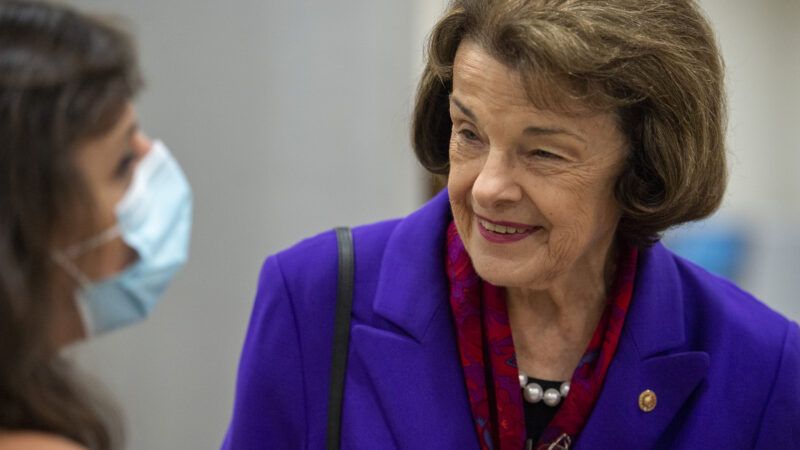Could Mandating Vaccines for Air Travelers Cost More Lives Than It Saves?
TSA security screenings led to more driving and thus more auto deaths. Mandating vaccines on airplanes could have a similar effect.

Most major airlines already require that their employees be vaccinated. Support is now mounting for a government vaccine mandate for airline passengers as well. But could this public health intervention end up costing more lives than it saves?
Last week, Sen. Dianne Feinstein (D–Calif.) introduced the U.S. Air Public Safety Act. The bill would require all passengers on flights leaving from or landing at a U.S. airport to show proof of vaccination, a negative COVID-19 test, or proof of a previous infection before boarding.
"We know that air travel during the 2020 holiday season contributed to last winter's devastating COVID-19 surge. We simply cannot allow that to happen again," said Feinstein in a press release. "Ensuring that air travelers protect themselves and their destination communities from this disease is critical to prevent the next surge."
Members of the Biden administration have also endorsed the idea.
"I would support that if you want to get on a plane and travel with other people that you should be vaccinated," said Anthony Fauci, President Joe Biden's chief medical advisor, last month. White House COVID response team coordinator Jeff Zients said the administration hasn't ruled out a vaccine mandate for air travelers, reports USA Today.
The carve-outs that Feinstein's bill makes for those with negative COVID tests and prior infections makes it more flexible than the vaccinate mandates that governments are imposing for bars, restaurants, and concert venues. Yet the proposed law would leave in place the Transportation Security Administration's (TSA) requirement that all passengers be masked throughout their flights.
The legislation would also effectively create a federal vaccine passport by requiring the U.S. Department of Health and Human Services, in consultation with the Federal Aviation Administration, to develop a single nationwide system for verifying passengers' vaccination status. That poses some grave civil liberties concerns. It would automatically exclude the 35 percent of the eligible population that isn't vaccinated from all air travel. A centralized system could also easily be expanded to exclude the unvaccinated from other modes of transportation.
It's also not clear that such a mandate would do much for public safety given the low risk of COVID transmission aboard flights. That low risk was detailed in an October 2020 article published in the Journal of the American Medical Association. Cabin air, the article's authors note, is recycled through HEPA filters which filter out virus particles. The way air flows within the cabin—from ceiling to floor, with little flow between rows—also reduces the odds of in-flight COVID transmission, they said.
"An airplane cabin is probably one of the most secure conditions you can be in," Sebastian Hoehl, a researcher at the Institute for Medical Virology at Goethe University Frankfurt in Germany, told Scientific American in November 2020.
A Wall Street Journal review of the medical literature published last week found that the risk of transmission is still generally considered to be low, although it is heightened during meal service on long flights (when everyone removes their mask at once) and during planing and deplaning.
Feinstein's press release cited a number of studies and polls to support her mandate proposal. Among them was a study published last year in PNAS, the journal of the National Academy of Sciences, which showed that increased travel between states and counties increased COVID transmission in destination communities, and a poll from the Kaiser Family Foundation finding that a third of people resistant to getting the vaccine would do so if it were required for air travel. The senator also cited a study from the Mayo Clinic finding that testing airline passengers would be an effective means of detecting active infections.
That first study, it's important to note, looked at the effect of travel generally on COVID transmission rates, and not at air travel specifically. The Kaiser poll, meanwhile, showed that the same number of vaccine-hesitant people could be induced to get the jab if it meant they didn't have to wear masks while traveling.
A proponent of vaccine mandates might well argue that even though airplanes are not high-transmission environments, they could still be made safer still by requiring passengers to be vaccinated or show a negative test.
That's true. Nevertheless, requiring testing or vaccination on airplanes will entirely deter some people from boarding flights, leading them to instead choose the more dangerous option of driving. That will mean more auto accidents and more resulting deaths, which could outweigh whatever safety benefits we'd get from lowering the already low risk of in-air COVID transmission.
TSA security serves as a good parallel. The added hassle the agency's pre-flight security screenings added to air travel encouraged people to substitute driving for flying, resulting in an estimated additional 500 auto deaths per year after 9/11. That almost certainly outweighed whatever terrorism-caused deaths the TSA's security screenings prevented.
Airplanes remain one of the least risky indoor spaces during the COVID-19 pandemic. The safety added by mandating vaccination and/or testing of airline passengers is likely minimal and even conceivably outweighed by the second-order effect of encouraging more driving instead of flying.
The benefits of Feinstein's vaccine mandate bill would also have to be weighed against the costs to civil liberties of creating a federal vaccine passport system that could, in time, be applied to more than just air travel.
The airlines should be free to require that their passengers are vaccinated. The Kaiser poll cited by the senator suggests that other, voluntary means of encouraging vaccination would be just as effective. That seems a superior alternative to yet another politically corrosive, possibly counter-productive government mandate.
Rent Free is a weekly newsletter from Christian Britschgi on urbanism and the fight for less regulation, more housing, more property rights, and more freedom in America's cities.


Show Comments (138)